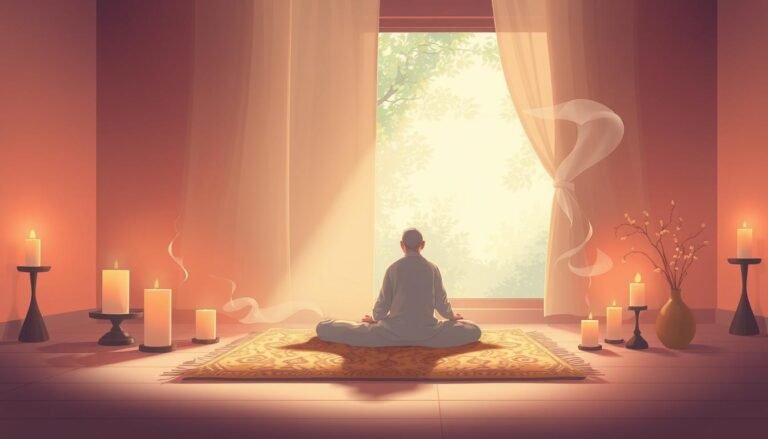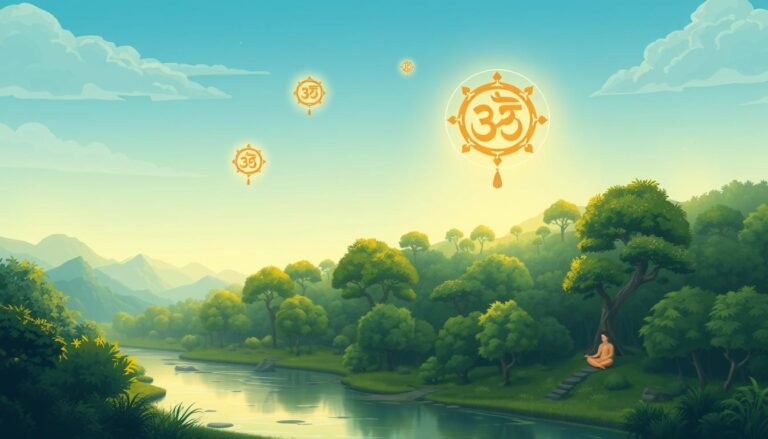What Are the Key Elements of African Spiritual Traditions?
“The spiritual journey is individual, highly personal. It can’t be organized or regulated. It isn’t true that everyone should follow one path. Listen to your own truth.” – Ram Dass
African spiritual traditions are as diverse as the continent itself. These indigenous African religions reflect a rich tapestry of beliefs, practices, and worldviews. They have shaped cultures for millennia. From the Asante of Ghana to the Yoruba in Nigeria, each group adds to Africa’s vibrant spiritual landscape.
At the heart of these traditions is a holistic worldview. This view sees the physical and spiritual realms as deeply connected. It embraces the natural world, ancestors, and divine forces as part of a grand, unified whole.
The cultural diversity within African spirituality is striking. Over 50 modern countries in Africa house countless ethnic groups. Each has its own unique spiritual practices. This diversity shows the rich cultural heritage of the continent.
Understanding these key elements helps us appreciate the depth and complexity of African spiritual traditions. It’s a journey into a world where the seen and unseen dance together. This shapes the lives of millions across the African continent and beyond.
Understanding the Diversity of African Spirituality
African spirituality is a rich mix of beliefs and practices. These vary across ethnic groups and regions. Each group, like the Yoruba in Nigeria and the Zulu in southern Africa, has its own spiritual ways.
Pluralistic Nature of African Religions
African cosmology sees spirituality in a pluralistic way. Many ethnic religions exist together, each with its own beliefs and rituals. This diversity creates a vibrant spiritual scene where different traditions can flourish together.
Regional and Ethnic Variations
Spiritual practices in Africa vary greatly by region. For example, the Igbo religion in southeastern Nigeria is different from the Maasai traditions in East Africa. These differences show how local cultures shape religious beliefs.
Holistic Worldview
African spirituality is a big part of daily life. It influences everything from politics and art to health and economics. As one person said, “Our spirituality is not just a Sunday affair; it’s woven into every aspect of our lives.”
There’s a growing interest in traditional African spiritual practices. Many people find these beliefs empowering and liberating. For example, in South Africa, a study found diverse healing methods, like praying to ancestral spirits and sacrificial rituals. This shows a desire to connect with true cultural identities and move away from colonial influences on spirituality.
The Concept of a Supreme Being in African Religions
African monotheism is a complex idea that changes with each culture. Many African religions believe in a supreme creator god. This god is seen as the ultimate source of life and existence.
In Yoruba tradition, Olorun is the supreme deity. He is known as the owner of the heavens and the source of all creation. East African beliefs also have Mulungu as the creator god. These gods are seen as distant, making intermediaries and ancestors key in daily spiritual practices.
The idea of a creator god in African religions is different from Western monotheism. Some traditions clearly define a supreme being, while others see a more diverse view. This shows the rich variety of African spirituality.
“The spirit world in traditional African beliefs is densely populated with spirit beings, spirits, and the living-dead or ancestors, closely related to the concept of mystical or impersonal powers and forces.”
African spiritual beliefs often include:
- Impersonal mystical powers
- Spirit beings
- Divinities or gods
- A Supreme Being
These elements shape the religious landscape across Africa. They influence practices in medicine, magic, and daily life. The spirit world is crucial, affecting human experiences in both good and bad ways.
Ancestor Veneration and Its Significance
Ancestor worship is key in many African spiritual traditions. It’s not just in Africa; it’s also big in Haiti, Latin America, and other places. People believe ancestors connect us to the divine.
Role of Ancestors in Daily Life
In African cultures, ancestors are very important. They watch over family and keep things right. People think ancestors can bless or curse us, based on how we treat them.
This idea guides our choices and actions. It helps keep the community together.
Rituals and Offerings for Ancestral Spirits
Keeping good relations with ancestors is key. Different tribes have their own ways of doing this. In Haiti, Vodou honors ancestors with big ceremonies.
In Latin America, like Mexico, there’s Dia de los Muertos to remember them. Offerings and rituals are common.
- Libations of palm wine or other drinks
- Food offerings at ancestral shrines
- Burning of incense or herbs
- Recitation of family lineages
Ancestral Influence on Community Well-being
Ancestors are seen as protectors of the community. They keep us together and teach us values. Good harvests, health, and wealth come from their blessings.
This belief strengthens our cultural identity and unity.
Our ancestors are not dead. They live in our memories, our traditions, and our daily lives. They guide us towards unity and prosperity.
African Spiritual Traditions and Nature Worship
African spiritual traditions are deeply rooted in nature worship. Many cultures across the continent believe in animism. This means they think spirits live in natural objects and phenomena. This belief leads to a deep respect for the environment and its forces.
Nature spirits are key in African spirituality. Trees, rivers, mountains, and animals are seen as sacred. They are believed to carry divine energy. This encourages people to live in harmony with nature.

Africa is full of sacred natural sites. The Bandiagara Escarpment is sacred to the Dogon people. The Sine River is special to the Serer. These places are important for rituals, prayers, and spiritual gatherings.
Nature’s role in African spirituality goes beyond worship. It shapes daily life, including farming, healing, and community decisions. By honoring nature, African cultures aim to live in harmony with their environment.
“In African spirituality, nature is not separate from us; it is an integral part of our existence. We are its custodians, and it is our teacher.”
This connection to nature still influences modern African societies. It reminds us of the importance of environmental conservation. It also highlights the need to respect nature in today’s fast-changing world.
The Importance of Rituals and Ceremonies
African spiritual traditions are deeply rooted in rituals and ceremonies. These practices mark significant life events and maintain cosmic harmony. Initiation rites play a crucial role in many African cultures, guiding individuals through important life transitions.
Rites of Passage
Initiation rites are a cornerstone of African spirituality. They signify the transition from childhood to adulthood and bind individuals to their community. The Maasai, for example, have initiation ceremonies that span 25 years, with each stage defining clear roles within society.
Seasonal and Agricultural Rituals
Fertility rituals are common across Africa, ensuring bountiful harvests and community prosperity. These seasonal ceremonies often involve music, dance, and symbolic offerings to honor nature spirits and ancestors.
Healing Ceremonies
Traditional African medicine is deeply intertwined with spiritual practices. Healing ceremonies address both physical and spiritual ailments, emphasizing the holistic nature of African health beliefs. These rituals often involve designated healers who use herbs, prayers, and spiritual interventions.
“Rituals in Africa encompass a wide range of activities including prayers, music, mystical and psychological manipulations, and participation in festivals and ceremonies.”
Communal ceremonies form the backbone of African spiritual life. They bring people together, reinforcing social bonds and cultural identity. From marriage traditions to harvest festivals, these events reflect the rich diversity of African spirituality and its enduring importance in modern times.
Divination Practices in African Spirituality
African divination is key in many spiritual traditions across the continent. It includes the Yoruba Ifa system and the Dogon’s fox prints. These practices offer spiritual guidance and fortune-telling to communities.
Diviners act as bridges between humans and spirits. They train hard to read signs and talk to spiritual beings. In some places, like the Baule of Côte d’Ivoire, diviners have spirit helpers during sessions.
In Burkina Faso, Lobi diviners use hand-holding to answer “yes” or “no”. Luba diviners in the Democratic Republic of Congo work in pairs. They shake objects in pots to guide people.
Silence is crucial in these practices. Many African cultures focus on non-verbal communication during divination. Diviners interpret movements or objects with little talking.
“The cosmic dance of light and darkness guides our path to wisdom.” – Yoruba proverb
The Ifa divination system is based on deep cosmology. It uses 256 octograms called “Odu” to study natural forces. This system sees the world around us as a mirror of the universe. It aims to understand how universal forces show up in our lives.
African divination keeps offering spiritual guidance and fortune-telling across the continent. It adapts to today’s world while keeping its ancient traditions.
The Role of Traditional Healers and Spiritual Leaders
In African cultures, traditional healers and spiritual leaders are key figures. They mix African shamanism with traditional medicine. This blend helps them offer spiritual guidance and lead the community. Their impact goes beyond health, touching all parts of society.
Types of Spiritual Practitioners
African spiritual practitioners have different roles:
- Diviners who interpret messages from the spiritual realm
- Herbalists skilled in traditional medicine
- Spirit mediums who communicate with ancestors
- Ritual specialists who perform ceremonies
Each type has a special role in keeping society and spirits in balance.
Training and Initiation
Training to become a spiritual leader is deep and long. Apprentices go through a tough initiation. They learn ancient wisdom and practices over years. This ensures they can serve their communities well.
Community Importance
Healers and leaders are vital for community health. They guide, solve conflicts, and heal spiritually and physically. In fact, 48.1% of Africans first turn to traditional or religious healers for mental health.
“Traditional African healing has been in existence for many centuries, serving as a cornerstone of community health and spirituality.”
Even with modern changes, these spiritual practitioners remain important. They connect ancient traditions with today’s needs.
African Spiritual Traditions: Myths and Oral Traditions
African mythology is the foundation of spiritual knowledge across the continent. It carries values, beliefs, and histories from one generation to the next. Creation stories tell us how the universe and humans came to be, often with animals and tricksters playing key roles.
The Dogon people of Mali have a captivating creation story. They believe Amma, the supreme god, created the world and all living beings. This myth highlights the diversity of African spiritual traditions.
Oral history is key in keeping these traditions alive. Without written records, stories change and grow, showing the ever-changing nature of African spirituality. This adaptability keeps myths relevant through time and across cultures.
“Our stories are our wisdom. They teach us about life, our ancestors, and our place in the world.”
Traditional African religions heavily rely on these oral traditions. Even though only about 10% of Africans practice indigenous faiths, their impact is still significant. Many who follow Christianity or Islam also incorporate traditional African spiritual elements into their beliefs.
- Creation myths explain cosmic origins
- Trickster tales teach moral lessons
- Animal spirits represent natural forces
- Ancestral stories connect past and present
These myths and stories continue to shape African culture today. They link us to our past and guide us into the future. This ensures the rich heritage of African spiritual traditions endures.
The Concept of Magic and Supernatural Powers
African magic is a big part of the spiritual traditions in Africa. It involves many practices that use cosmic forces for different goals. In African cultures, magic is seen as a way to use spiritual power and change the natural world.
Traditional African societies have two kinds of magic: good and bad. Good magic helps protect, heal, and bring wealth to people and communities. Bad magic, linked to sorcery, is used to harm or bring bad luck.
Spiritual practitioners in Africa are thought to have special powers. These powers include:
- Shapeshifting
- Communicating with spirits
- Controlling natural elements
- Divination
Using charms, amulets, and fetishes is common in African magic. These items are believed to carry spiritual power and protect against evil. Many African communities have special roles for magical practices, like medicine-men, divinators, and rain-makers.
Rain-makers are thought to have magical powers from sky deities. Their rituals mix religion and magic to change the weather. Priest-magicians, another key figure, need deep knowledge of reality and control over nature.
African magic and supernatural abilities still play a big role in many societies today. They show a view where the natural and supernatural worlds interact, shaping beliefs and daily life.
African Indigenous Belief Systems and Cosmology
African cosmology is filled with rich beliefs that shape the spiritual world of the continent. These beliefs are at the heart of many African cultures. They influence daily life and social structures.
Creation Myths
Creation myths are key in African spiritual traditions. They tell us how the universe and humans came to be. For instance, the Yoruba people believe Olorun created the world.
Other cultures have their own stories. These myths often include divine beings, animals, and natural elements. They work together to create the cosmos.
Spiritual Realms and Entities
The spirit world is central in African cosmology. Many traditions see multiple spiritual realms with different entities. These include supreme beings, lesser gods, ancestral spirits, and nature spirits.
This spiritual hierarchy creates a complex network. It connects the physical and spiritual worlds.
Concepts of Afterlife
African beliefs about the afterlife vary. Some traditions believe in reincarnation, where souls return to the physical world within family lineages. Others see spirit realms where ancestors live and influence the living.
These beliefs shape funeral practices and the relationship between the living and the dead.
Understanding African indigenous belief systems is complex. They are diverse and continue to evolve. They adapt to modern challenges while keeping their core spiritual values.
Sacred Objects and Symbols in African Spirituality
African religious artifacts are key in spiritual practices across the continent. Wood is the main material for these ritual objects. Metals like copper, bronze, and iron are also used. Spiritual specialists activate these items through special ceremonies.
These ceremonies often include organic materials like feathers, hair, and shells. This adds symbolic meaning to the objects.
Power figures are a common type of sacred art in African traditions. They act as guardians, healers, and messengers to the spirit realm. These objects are used in both public and private settings. Some belong to individuals, while others belong to communities.
Despite the rich history of African spirituality, only about 15% of Africans follow traditional religions today. In the Kalabari Kingdom, for example, 95% of Ijaw people now identify as Christian. This shows how Christianity and Islam have become more common in Africa.
Yet, many sacred traditions continue. For example, Dogon sculptures remain hidden in family homes or sanctuaries. This secrecy highlights the enduring nature of these traditions.
As cities grow and modernization advances, African religious artifacts are finding new uses. Cross-cultural influences have blended artistic styles and techniques. This blending shows the adaptability and strength of African spiritual traditions in changing times.
Source Links
- African religions | Traditional Beliefs & Practices | Britannica
- African Traditional Religion | South African History Online
- The Essence of African Traditional Religion
- African spirituality makes space for my divinity and queerness – Minority Africa
- unearthing beliefs and practices for the helping professions
- Africa Traditional Religious System as Basis of Understanding Christian Spiritual Warfare – Lausanne Movement
- Gods, ancestors, and spirit beings
- Honouring Ancestors: A Sacred Tradition in Haiti, Africa, and Latin America
- Ancestor Veneration, Etrog on Sukkot, And Celebration of Life and Nature: A Collection Display on Agricultural Harvesting, Cultural and Religious Practices in Africa, the Middle East and Central Asia | 4 Corners of the World
- Remembering Our Ancestors: A Legacy of African Spirituality
- This Far by Faith . Journey 1
- No title found
- Ceremonies, festivals, and rituals
- RITUALS IN AFRICAN TRADITIONAL RELIGION
- African Ceremonies: PASSAGES – Google Arts & Culture
- The Silent Voices of African Divination
- African divination
- LibGuides: African Traditional Religions: Ifa Divination: Hermeneutics
- Understanding traditional African healing – PMC
- Traditional and religious healers in the pathway to care for people with mental disorders in Africa: a systematic review and meta-analysis
- The spirituality of Africa — Harvard Gazette
- Traditional African religions
- African magic
- Conjure Magic And Supernaturalism In Nineteenth-Century African American Narratives
- Rethinking the Study of African Indigenous Religions
- Worldview, cosmology, and myths of origin
- Sacred Objects and Power Figures | African Art Class Notes | Fiveable
- 27.1: Religious Art in Africa








